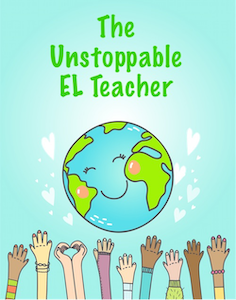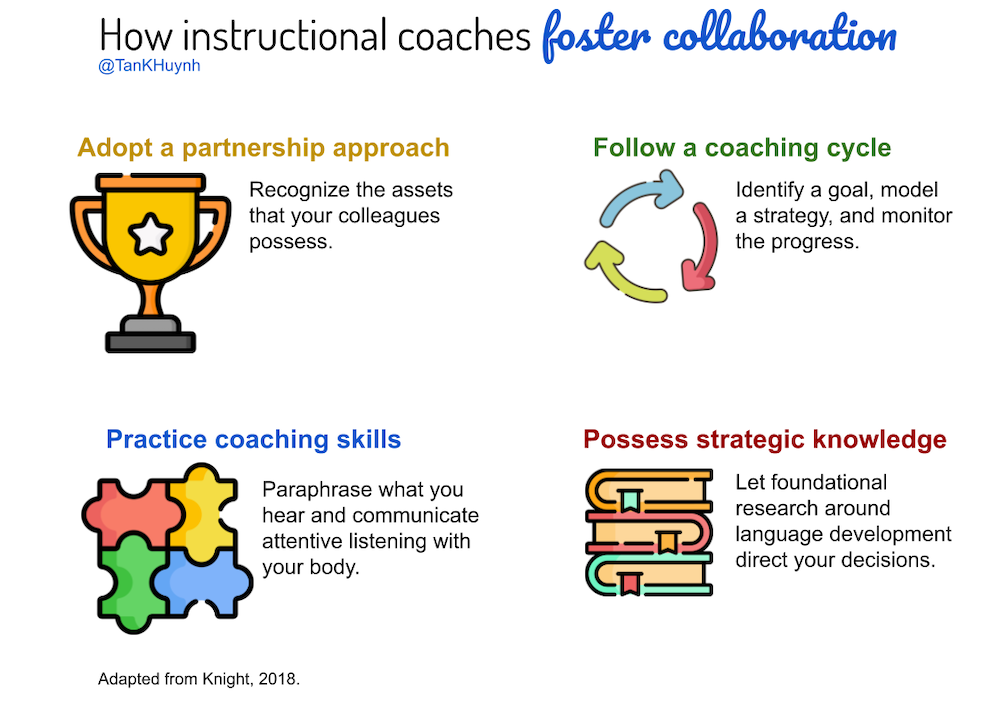Lessons from Coaching for Language Specialists
A MiddleWeb Blog

In the field of instructional partnerships and collaboration, Dr. Jim Knight at the University of Kansas is a leading expert on instructional coaching.
He has conducted more than 25 years of research on the topic. In addition to his popular books Instructional Coaching: A Partnership Approach and High-Impact Instruction, Jim has written The Impact Cycle specifically for instructional coaches who want to “foster powerful improvements in teaching.”
This article summarizes the highlights from our podcast conversation on the four essential components of highly effective instructional coaches. I have pulled out his essential takeaways and have aligned them to the core work of language specialists. Here’s what we can learn:
Adopt a Partnership Approach
The first component we can learn from instructional coaches is to see our colleagues through an asset-based lens, in the same way we view students. We must recognize that they have content expertise, instructional practices, and life and cultural experiences that are beneficial to collaboration, learning, and the school community.
This is very similar to an asset-based approach we language specialists are encouraged to use with our language learners and their families (Nora & Echevarría, 2016). Much like our work with our language learners, dynamic collaboration between teachers hinges on our ability to celebrate and build on our colleagues’ strengths.
Jim suggested that if we interact with our colleagues in this way, a lot of interpersonal conflicts could be reduced or greatly eliminated. To adopt a Partnership Approach, even before meeting with new teaching partners, we might consider their:
- Years of service
- Technical training (e.g., teaching endorsements, certifications, majors)
- Diversity of teaching experiences (e.g., type of schools taught in, roles, communities served)
- Life experiences (e.g., careers prior to teaching, hobbies, interests, marital status, with or without children, sexual orientations)
- Cultural backgrounds (e.g., nationalities, places where they were born, languages they speak, religious affiliations)
Follow a Coaching Cycle
From his research, Jim has developed an evidence-based coaching process called the Impact Cycle (Knight, 2018). Language specialists can also follow this process. The steps of the Impact Cycle are:
1. Identify:
Describe the current reality, set a goal, and identify a strategy to meet the goal.
2. Learn:
Create checklists that describe teaching practices and model instructional strategies.
3. Improve:
Monitor the teacher’s progress towards the goal and modify the teaching strategy until the goal is met.
For language specialists, this translates to
- identifying a goal a content teacher has that is related to serving language learners;
- modeling a strategy that scaffolds learning in content classes, and
- guiding the content teacher until LL’s have achieved mastery.
Practice Coaching Skills
Both instructional coaches and language specialists must have interpersonal habits that facilitate the coaching process. These habits help you avoid being overly directive and support you in fostering a productive dialogue with your colleagues.
Coaching (and collaboration) skills include:
- reading body language
- being mindful of one’s body language
- effectively paraphrasing and summarizing
- listening attentively and respectfully (i.e., not multitasking)
Possess Strategic Knowledge
Language specialists have to deeply understand language development and acquisition to support their colleagues. We abandon exclusionary, deficient-oriented practices we may have seen or experienced ourselves that our colleagues may not yet see the harm in (e.g., pull-out interventions, English-only policies, monocultural education, and Anglicizing names).
We must consider not teaching the way we have been taught.
Remember that schools have historically been tools of the oppressor, and we must identify schooling practices that seem well-intentioned but are actually oppressive to minority students. Our recommendations must be grounded in laws, research, and foundational frameworks such as:
- WIDA
- teacher collaboration
- sheltered instruction
- literacy development
- scaffolding & differentiation
- culturally-sustaining pedagogy
Closing
The biggest distinction between instructional coaches and language specialists is that the former focuses on upskilling the teachers they work with. We do not.
Our goal is to work together with our colleagues to make learning an equitable and accessible experience for language learners. The four components that Jim Knight recommended are equally valuable as a guide to both instructional coaches and language specialists.
Our collaboration depends on our ability to be relational rather than directive, responsive instead of prescriptive, supportive instead of judgmental.
In the comment section, explain what about these connections struck a chord with you the most. I’m excited to read your responses.
References
Knight, J. (2018). The impact cycle: What instructional coaches should do to foster powerful improvements in teaching. Thousand Oaks, CA: Corwin.
Nora, J., & Echevarría, J. (2016). No more low expectations for English learners. Portsmouth, NH: Heinemann.
































